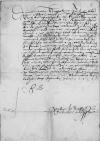 GStA, PK, HBA, C 2, No 29, f. 3v
GStA, PK, HBA, C 2, No 29, f. 3v
Dem durchlaucht(e)n, hochgebornen(n) furst(en) und h(e)rn, / h(e)rnn ⌊Albrechten(n)⌋, margraffenn(n) zu ⌊Brandenburg⌋ etc. herczogen(n) in(n) ⌊Preussen(n)⌋ etc. meym(m) gnedig(en), lyb(e)n h(e)rnn
 GStA, PK, HBA, C 2, No 29, f. 2r
GStA, PK, HBA, C 2, No 29, f. 2r
Durchlauchter, hochgeborner furst, g(nediger), liber(r) herr(r). Meyn(n) gancz willige dienste zuvoran(n). /
Noch dem(m) ich gesunt bin her komen(n), / hot mich meyn(n) gunstiger freundt, her(r) ⌊Achacius Czeme⌋, danczker castellan(n), bericht, / wie bey im sey E(wer) G(naden) bot, / der sich dissen tag widerum(m)b zu E(wer) G(naden) sol begeben(n). / Und wie wol ich negst vom(m) ⌊Alten(n) Hause⌋ E(wer) G(naden) ⌊⌋, / hab ich dennoch written over (en)⌈(en)hh written over (en)⌉ / nicht mocht noch lossen(n) abermals E(wer) G(naden) mit dissem(m) meynem(m) schreiben(n) zubesuchen(n), / nemlich der halben(n), / so es villeichte E(wer) G(naden) gen(n) ⌊Resenburg⌋ zu komen(n) nicht wer gelegen(n), / wolde mir ein(n) andre nahent bey stelle seczenn(n), / do hin ich mich, / vorlossende andere vorgenomen(n) wege, / mocht aus disser ⌊tagefart⌋ findenn(n), / dan(n) in allem(m) E(wer) G(naden) fruntlich unn(n)d williglich zu dynen(n) / wil ich alzeit gehorszam(m) gefunden werden(n) / un(n)d thu mich so hiemit in E(wer) G(naden) gunst hochlich befelen(n). / Got der almechtige spare E(wer) G(nade) in langeweriger glugseligheit und zunemen(n) lange zceit gesunt. /
Dat(um) ⌊Marienburg⌋, denn(n) leczsten(n) tag Septembr(is) an(n)o d(omi)ni 1532.
E(weren) F(urstlichen) G(naden)
willig(e)r ⌊Jo(annes)⌋, bischoff zu ⌊Culmen(n)⌋ etc. ma(n)u p(ro)pria
 GStA, PK, HBA, C 2, No 29, f. 1r
GStA, PK, HBA, C 2, No 29, f. 1r
E(wer) G(naden) wirt mich von(n) hynnen(n) lösenn(n) mit dem ersten(n) schreib(e)n. / So werd ich ouch ursach habenn(n) mit guttem gelÿmff von(n) hynnen(n) zu scheiden(n). / Bitt derhalben(n) mit den(n) erst(e)n um(m)b ein gunstig antwurt.
 GStA, PK, HBA, C 2, No 29, f. 3v
GStA, PK, HBA, C 2, No 29, f. 3v  GStA, PK, HBA, C 2, No 29, f. 2r
GStA, PK, HBA, C 2, No 29, f. 2r  GStA, PK, HBA, C 2, No 29, f. 1r
GStA, PK, HBA, C 2, No 29, f. 1r 


